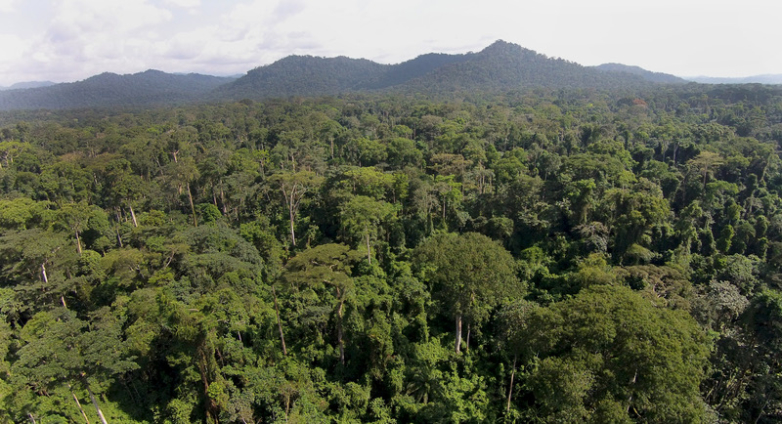The Congo Basin is the largest forest in Africa and a significantly important carbon storage in the world.
With more than 10,000 plant species in and around the forest, the Basin is referred to as the “green lungs of Africa” – the ecological respiratory organ for the planet.
The rainforest of the Congo basin spans over six countries – Cameroon, Central African Republic, Democratic Republic of the Congo, Equatorial Guinea, Gabon and Republic of the Congo – providing food, freshwater, medicine, security and an essential lifeline for local populations and serves as a critical habitat for endangered species.
But most critically, preserving the rich ecosystem of the Congo Basin is essential in the global efforts to tackle the effects of climate change and biodiversity loss.
The soils and plants of the Congo Basin rainforest store incredible amounts of carbon, preventing it from being emitted into the atmosphere and fueling climate change.
Carbon sinks are natural areas such as oceans and forests, which absorb carbon dioxide (Co2) from the atmosphere, helping to curb global warming.
The Congo Basin, with its dense tropical peatlands, is estimated to pull around 4% of global Co2 emissions out of the atmosphere each year.
Threat of land grabbing and industrial agriculture
Central Africa's rainforest stood at 178 million hectares in 2005.
The African region has lost 65 per cent of its productive land over the last 70 years, whereas the population has grown at least sixfold over the same period.
The Congo Basin is increasingly coming under threat due to deforestation, environmental degradation, growing populations, and the impact of climate change.
Several international fossil fuel and industrial-scale agriculture developers, mostly in rubber and oil palm plantations and, fueling wide-scale deforestation.
The move for land grabbing to exploit Africa’s resources for export has put the Congo Basin under threat. Illegal timber cut in the Basin is exported to the EU, US and China.
Unsustainable and illegal logging in the Congo Basin forest is leading to deforestation, destruction of wildlife habitat, diminished resilience to climate change.
Forest loss in the Congo Basin increased by 5% in 2021. The Democratic Republic of Congo alone lost nearly 500,000 hectares of primary forest in 2021.
The increased loss of biodiversity and threatened species will undermine efforts to protect biodiversity, and of the need to take urgent action to preserve ecosystem services vital to human well-being, including crop pollination, water purification, food security, clean air, flood protection and carbon sequestration.
Of the hundreds of mammal species discovered in the Congo Basin so far — including forest elephants, gorillas, chimpanzees, and okapis — 39 are found nowhere else on earth. Of its estimated 10,000 plant species, 3,300 are also unique to the region.
Conserving the Basin as climate action
The United Nations Environment Assembly recognizes that the Congo Basin peatlands contain a high proportion of organic carbon, making them one of the world's largest carbon sinks, contributing to the mitigation of global climate change.
This is in “considering the benefits and values of Congo Basin peatlands, which sequester more than 31 billion tonnes of carbon and provide vital ecosystem functions and services that reduce the magnitude and mitigate the impact of floods and droughts, preserve biodiversity and provide food and water supplies,” emphasized the African Ministerial Conference on the Environment (AMCEN).
At the recent AMCEN meeting in Addis Ababa, the African Group of Negotiators was urged to continue working with the COP 28 parties and the presidency to reach further decisions that recognize the special needs and circumstances of Africa and “to intensify regional and international collaboration to promote a multi-stakeholder approach to the conservation and sustainable management of peatlands in the Congo Basin, in line with Brazzaville 2018 declaration; adopted at the third meeting of Global Peatlands Initiative partners”.
The leaders also welcomed the initiative of the Republic of Congo to organize the Summit "Amazon - Borneo - Mekong and Southeast Asia - Congo, Summit of the Three Basins of Ecosystems of Biodiversity and Tropical Forests (S3B EBFT)".
This is in order to constitute, through the union of the three basins, a global alliance, biodiversity ecosystems and tropical forests, an Alliance/Coalition with a South-South governance, structuring the three global ecosystems that represent 80% of tropical forests around the world, bringing together 2/3 of terrestrial biodiversity and ensuring the vital role of global regulator of carbon balance and life on earth.
The three basins are expected to capture 80% of the existing and future financial mobilization announced at COP 27 for climate and COP 15 for biodiversity.
Latest Stories
-
Ghana’s Education Quality ranked 125 out of 183 countries in latest Global Youth Development Index
19 mins -
Emma Stone wants people to use her real first name
23 mins -
FIFA Club World Cup 2025: Sundowns, Esperance join Al Ahly and Wydad as CAF representatives
4 hours -
CAFCL: Al Ahly set up historic final with ES Tunis
5 hours -
We didn’t sneak out 10 BVDs; they were auctioned as obsolete equipment – EC
8 hours -
King Charles to resume public duties after progress in cancer treatment
9 hours -
Arda Guler scores on first start in La Liga as Madrid beat Real Sociedad
9 hours -
Fatawu Issahaku’s Leicester City secures Premier League promotion after Leeds defeat
9 hours -
Anticipation builds as Junior Speller hosts nationwide auditions
10 hours -
Etse Sikanku: The driver’s mate conundrum
10 hours -
IMF Deputy Chief worried large chunk of Eurobonds is used to service debt
11 hours -
Otumfuo Osei Tutu II celebrates 25 years of peaceful rule on golden stool
11 hours -
We have enough funds to pay accruing benefits; we’ve never missed pension payments since 1991 – SSNIT
11 hours -
Let’s embrace shared vision and propel National Banking College – First Deputy Governor
12 hours -
Liverpool agree compensation deal with Feyenoord for Slot
12 hours

